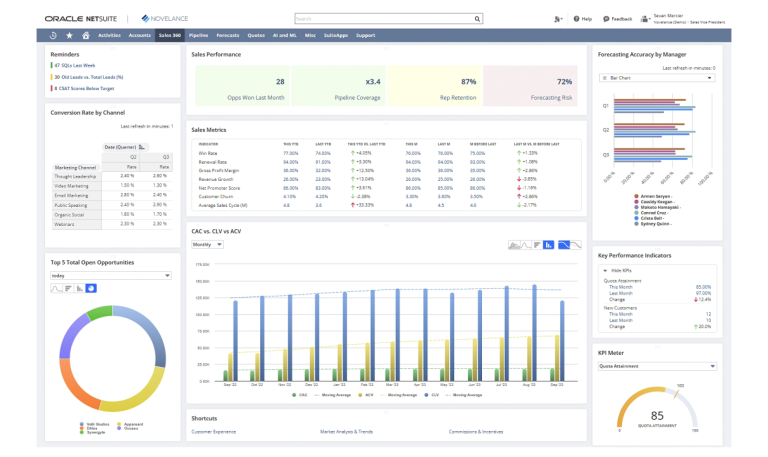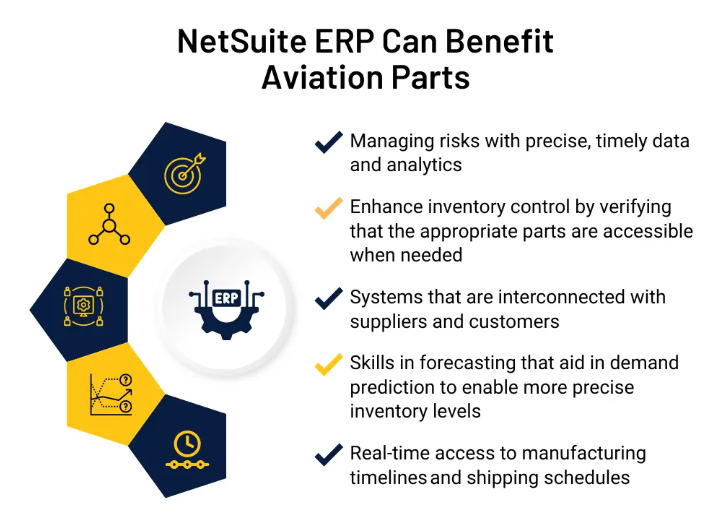
NetSuite For Aviation and Airline Industry
In the dynamic and highly competitive aviation industry, where precision, efficiency, and compliance are paramount, having a robust and reliable system to manage your operations is no longer a luxury but a necessity. NetSuite, a leading cloud-based Enterprise Resource Planning (ERP) solution, has emerged as the go-to choice for airlines, charter operators, and MROs (Maintenance, Repair, and Overhaul) organizations worldwide.
With its comprehensive suite of features specifically tailored to the aviation industry, NetSuite for aviation offers a holistic solution that streamlines operations, enhances visibility, and drives profitability. From managing aircraft fleets and crew scheduling to handling complex financial transactions and ensuring regulatory compliance, NetSuite for aviation provides a unified platform that empowers aviation businesses to soar to new heights.
Take advantage of a modern ERP solution: NetSuite for Aviation
Many businesses rely on a patchwork of different software tools to manage their operations. For example, they might use QuickBooks for accounting and Salesforce for customer relationship management. This fragmented approach can create confusion and inefficiencies, as data may not be shared effectively or accurately between systems. To streamline your business processes and avoid these issues, consider implementing a unified ERP solution like NetSuite.
1. NetSuite Charter Quote Management
Charter Quote Management is a comprehensive module designed to streamline the entire charter process, from initial sales inquiries to final agreements, flight tracking, and invoicing. It offers a range of features to enhance efficiency and accuracy, including:
- Integrated Sales and Accounting: Seamlessly integrates with NetSuite’s sales and accounting modules to provide a unified view of the charter process.
- Customizable Quote Templates: Allows for the creation of customizable quote templates to streamline the proposal process and ensure consistency.
- Margin Calculation: Automatically calculates profit margins based on various factors, including fuel costs, crew expenses, and aircraft rental fees.
- Flight Tracking: Provides real-time flight tracking capabilities to monitor the progress of charter flights and ensure timely updates to customers.
- Invoice Automation: Automates the creation of invoices, including the calculation of taxes, fees, and applicable discounts.
2. NetSuite Aircraft Asset Tracking
NetSuite Aircraft Asset Tracking is a powerful tool for tracking and managing all company-owned and leased assets, including aircraft, engines, and equipment. Key features include:
- Centralized Asset Database: Maintains a centralized database of all assets, including detailed information such as serial number, purchase date, cost, and depreciation schedule.
- Depreciation Calculation: Automatically calculates depreciation expenses based on various methods, including straight-line, declining balance, and units of production.
- Asset Tracking: Provides real-time tracking of asset locations and usage to ensure optimal utilization and prevent loss or theft.
- Asset Disposal: Manages the disposal process, including the creation of disposal orders, calculation of salvage value, and removal from the asset register.
- Regulatory Compliance: Ensures compliance with relevant accounting standards and tax regulations regarding fixed asset management.
3. NetSuite Crew Management
It is a comprehensive module for managing human resources within the airline industry. Key features include:
- Crew Scheduling: Creates and manages crew schedules based on flight schedules, crew availability, and regulatory requirements.
- Flight Duty Time Tracking: Accurately tracks flight duty times to ensure compliance with aviation regulations.
- Compensation Management: Manages crew salaries, bonuses, overtime pay, and other compensation components.
- Training Management: Tracks crew training records and ensures compliance with mandatory training requirements.
- Performance Evaluation: Provides tools for evaluating crew performance and identifying areas for improvement.
4. NetSuite Airline Inventory Control
It is a critical component of airline operations, ensuring the availability of essential parts and supplies. Key features include:
- Real-Time Inventory Tracking: Provides real-time visibility into inventory levels across multiple locations.
- Stock Level Optimization: Helps optimize stock levels to minimize excess inventory while ensuring adequate supplies.
- Purchase Order Management: Streamlines the purchase order process, from creation to approval and receipt.
- Vendor Management: Manages relationships with suppliers, including contract negotiation, performance evaluation, and payment processing.
- Lot Traceability: Tracks the history of individual items, including supplier, purchase date, and lot number.
5. NetSuite Accounting & Financial Management
Accounting & Financial Management is a comprehensive module that provides a robust set of tools for managing the financial aspects of an airline business. Key features include:
- General Ledger: Maintains a general ledger to record all financial transactions and generate accurate financial statements.
- Accounts Receivable: Manages customer invoices, payments, and collections.
- Accounts Payable: Manages vendor invoices, payments, and disbursements.
- Cash Flow Management: Monitors cash inflows and outflows to ensure adequate liquidity.
- Financial Reporting: Generates a variety of financial reports, including income statements, balance sheets, and cash flow statements.

6. NetSuite Fleet & Transportation Management
Fleet & Transportation Management is a module designed to optimize the management of an airline’s fleet of aircraft. Key features include:
- Aircraft Maintenance Scheduling: Creates and manages maintenance schedules to ensure the safety and reliability of aircraft.
- Fuel Management: Tracks fuel consumption, purchases, and costs to optimize fuel efficiency.
- Flight Planning: Assists in flight planning, including route selection, flight time estimation, and fuel calculations.
- Aircraft Utilization: Monitors aircraft utilization to maximize profitability and minimize downtime.
- Regulatory Compliance: Ensures compliance with aviation regulations related to fleet operations.
7. MRO (Maintenance, Repair & Overhaul) Management
MRO Management is a module specifically designed for maintenance, repair, and overhaul (MRO) operations. Key features include:
- Work Order Management: Creates and manages work orders for maintenance tasks, including scheduling, resource allocation, and progress tracking.
- Parts Inventory Management: Manages inventory of spare parts and components required for maintenance.
- Quality Control: Ensures adherence to quality standards and procedures throughout the maintenance process.
- Cost Control: Tracks maintenance costs to identify areas for cost reduction and improve efficiency.
- Regulatory Compliance: Ensures compliance with aviation regulations related to MRO operations.
8. Comprehensive Project Management
It is a module that helps airlines maintain compliance with industry regulations and standards. Key features include:
- Internal Audit Management: Facilitates the planning, execution, and reporting of internal audits to assess compliance and identify areas for improvement.
- Regulatory Compliance Tracking: Tracks compliance with aviation regulations, including safety, environmental, and financial regulations.
- Audit Trail: Maintains an audit trail of all changes made to the system to ensure accountability and transparency.
- Risk Assessment: Identifies and assesses potential risks to the airline’s operations and implements appropriate mitigation measures.
9. NetSuite System Integrations
Third-Party Integrations allow NetSuite for aviation to connect with other systems used by the airline, such as reservation systems, flight planning software, and customer relationship management (CRM) systems. This enables seamless data exchange and improves overall efficiency.
Key benefits of third-party integrations include:
- Improved Data Visibility: Provides a unified view of data from multiple systems, enabling better decision-making.
- Reduced Manual Data Entry: Automates data transfer between systems, reducing the risk of errors and saving time.
- Enhanced Workflow Integration: Streamlines processes by automating data exchange between systems.
- Increased Efficiency: Improves overall operational efficiency by eliminating redundant tasks and reducing manual effort.
NetSuite for Aviation and Airline Industry Modules

Flight Operations Module
Route and Flight Scheduling
Helps in route planning, flight scheduling, and tracking the status of flights, providing seamless control of daily flight operations. This ensures efficient aircraft movement, flight service arrangements, and crew eligibility checks.Crew and Aircraft Management
Manages crew eligibility and aircraft availability for each flight, ensuring that the right personnel and aircraft are available at the right time for smooth operations.Passenger and Cargo Management
Handles details related to passengers, baggage, and cargo for each flight sector, giving a comprehensive view of all logistical aspects.Empty Leg Flight Management
Provides an advanced option for managing empty leg flights, optimizing logistics and improving aircraft utilization.Flight Database with Advanced Filters
Includes a comprehensive database with advanced filters and reporting capabilities to store, retrieve, and analyze flight data.Interactive Flight Timeline
Offers an interactive view of flight schedules, making it easy to track and manage flights in real-time.Routing and Service Templates
Provides control over routing services with template-based requests, simplifying and standardizing the process.Automated Weather and NOTAM Updates
Automatically updates weather conditions and NOTAMs (Notices to Airmen) for flight airports, ensuring accurate and timely information.Revenue and Cost Control
Directly links revenue and cost management to accounting systems, streamlining financial tracking and reporting.Flight Schedules Import/Export
Allows the import and export of flight schedules from external sources in various formats, such as SSIM.Integration with Flight Planning Software
Integrates with flight planning software for accurate ATC routes, flight times, fuel requirements, and lists of overflying countries.Global Flight Schedules and Notifications
Supports SMS notifications, import/export of flight schedules, and integration with global flight schedules databases like Innovata.
Fleet Management Module
Aircraft and Technical Database
Contains a comprehensive database of aircraft and aircraft types with full technical details, including specifications and photo galleries.Aircraft Utilization and Planning
Helps in proper aircraft planning and utilization, ensuring efficient management of both owned and leased aircraft fleets.Maintenance and Document Tracking
Tracks scheduled maintenance and monitors expired documents with notifications, keeping the fleet operational and compliant.MEL Resources Tracking
Monitors Minimum Equipment List (MEL) resources, ensuring aircraft meet regulatory standards and are ready for operation.ACMI Rates and Charges Database
Includes a detailed database of ACMI (Aircraft, Crew, Maintenance, and Insurance) rates for various locations, streamlining cost management.Customizable Reporting
Provides advanced customizable reports based on flight and aircraft performance data, helping companies track utilization, costs, and efficiency.
Fleet Management Module
Aircraft and Technical Database
NetSuite for Aviation Industry contains a comprehensive database of aircraft and aircraft types with full technical details, including specifications and photo galleries.Aircraft Utilization and Planning
Helps in proper aircraft planning and utilization, ensuring efficient management of both owned and leased aircraft fleets.Maintenance and Document Tracking
NetSuite for Aviation Industry tracks scheduled maintenance and monitors expired documents with notifications, keeping the fleet operational and compliant.MEL Resources Tracking
Monitors Minimum Equipment List (MEL) resources, ensuring aircraft meet regulatory standards and are ready for operation.ACMI Rates and Charges Database
Includes a detailed database of ACMI (Aircraft, Crew, Maintenance, and Insurance) rates for various locations, streamlining cost management.Customizable Reporting
NetSuite for Aviation Industry provides advanced customizable reports based on flight and aircraft performance data, helping companies track utilization, costs, and efficiency.
Conclusion
In conclusion, NetSuite for aviation provides a comprehensive and integrated solution that addresses the unique operational and financial needs of the aviation industry. From optimizing flight operations, fleet management, and crew control to streamlining fuel pricing and aviation services, NetSuite empowers aviation companies with real-time data and automated processes.
This system ensures greater efficiency, accuracy, and compliance, reducing the complexities associated with managing flights, aircraft, and services. By offering advanced reporting, seamless integrations, and customizable modules, NetSuite not only enhances day-to-day operations but also positions aviation businesses for scalable growth, improved decision-making, and increased profitability. Ultimately, NetSuite for aviation serves as a pivotal tool in modernizing aviation management and ensuring long-term operational success.
Schedule a free consultation with a premier NetSuite Implementation Partner today.






